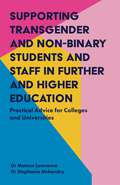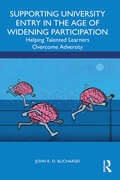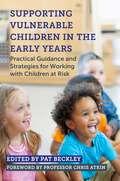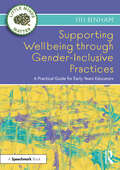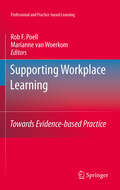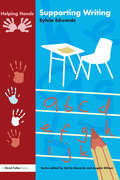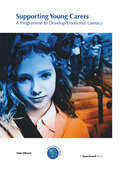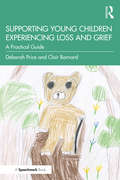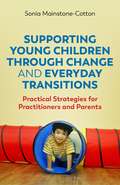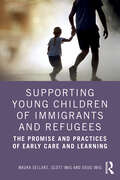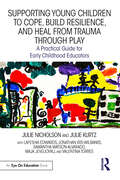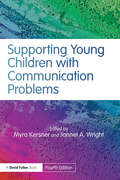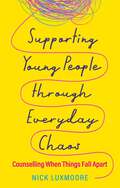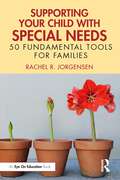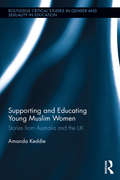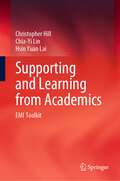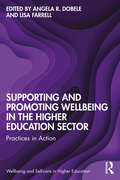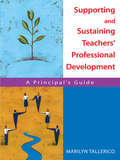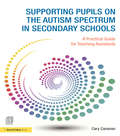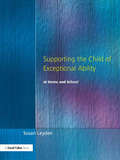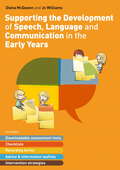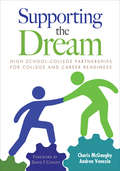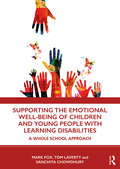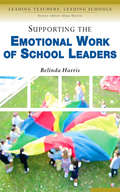- Table View
- List View
Supporting Transgender and Non-Binary Students and Staff in Further and Higher Education: Practical Advice for Colleges and Universities
by Matson Lawrence Stephanie MckendryAccording to the research underpinning this book, 85% of trans students and staff faced barriers. This practical guide enables post-secondary education professionals to create a safe and supportive environment for gender diverse applicants, students and staff. Using real life examples to explore common experiences and challenges for trans people in further and higher educational settings, it sets out policies, interventions and advice that have proven effective in providing impactful support on a wide range of issues such as learning, teaching, mental health, recruitment, support services, and institutional policies. Included is an easy-to-follow introduction to transgender terminology and identities, as well as legal and medical considerations.
Supporting University Entry in the Age of Widening Participation: Helping Talented Learners Overcome Adversity
by John R. BlicharskiDesigned for those working with widening participation students, this key guide provides all of the information needed to support learners from widening participation backgrounds and ensure fair admission to university can be effectively delivered. Providing the reader with a theoretical and practical understanding of how to reach non-traditional students, this book addresses the realities of the challenges the modern university widening participation applicant faces. Each chapter offers a fresh and engaging insight into widening participation and explores the fascinating range of factors that determine whether students from non-traditional backgrounds successfully access university and benefit from it. This book systematically considers the barriers, approaches and solutions required to reach university and encourages a ‘best evidence’ approach that could enable the people of tomorrow to have more equal access to learning and through that, a positive and healthy future on a planet under severe challenge. Ideal reading for all those working in widening participation or committed to expanding the diversity of their student populations, this book offers the insights, advice and considerations needed when deciding how best to help often highly vulnerable and unsupported students transform their lives through learning.
Supporting Vulnerable Children in the Early Years: Practical Guidance and Strategies for Working with Children at Risk
by Julie Percival Pat Beckley Yinka Olusoga Sarah Howe Professor Chris Atkin Antony Luby Nishi Bremner Julia Lindley-Baker Elizabeth Farrar Rosey Shelbourne Gina Taylor Helen Thornalley Beverley Keen Dr Margaret Simms Anne Renwick Emmy SealeyExploring specific experiences, circumstances and events that can put children at risk, this book provides practical guidance for early years practitioners working with vulnerable children. It covers supporting children who are abused and neglected, those with special educational needs, children from ethnic minorities, those with emotional or health difficulties, children affected by poverty and children in care.Each chapter draws on current research and theories to set out clear advice and strategies for supporting the wellbeing and development of vulnerable children, including working in partnership with parents, carers and communities.
Supporting Wellbeing through Gender-Inclusive Practices: A Practical Guide for Early Years Educators (Little Minds Matter)
by Fifi BenhamGender is a broad and complex concept, the impact of which can start even before a baby is born. It can be a source of restriction, but it is also a source of joy, and early years practitioners have a unique opportunity to empower new generations by creating gender inclusive environments where children feel confident and, above all, happy.This accessible and practical guide provides meaningful advice on how to improve and promote gender inclusion and wellbeing in early years settings. Chapters cover key areas, from gendered language and gender inclusive environments to trans and non-binary childhoods and encourage practitioners to reflect deeply on the way gender has impacted their own lives. The book provides: An overview and analysis of current guidance around gender equality and how this is integral to best practice. Real-world practical tips and strategies that can be introduced right away, including advice for working effectively with parents. Book recommendations for settings and consideration of the language used in fairy tales and nursery rhymes, as well as signposting to further learning for practitioners. Guidance on creating gender inclusive environments and making space for children to play around and make choices based on what brings them joy. Reflection points, practitioner reflections and case studies to bring theory to life. The early years presents the perfect time to encourage the exploration of identity as part of play, and the book enables practitioners to actively engage with this, to recognise and celebrate individuality, and to promote social, emotional, and mental wellbeing. This refreshing guide empowers practitioners to push boundaries in their setting to enable and maximise a positive approach to gender in practice. It is essential reading for all early years practitioners, as well as childminders and early childhood students.
Supporting Workplace Learning: Towards Evidence-based Practice
by Marianne Van Woerkom Rob F. PoellDuring the 1990s, the workplace was rediscovered as a rich source of learning. The issue of workplace learning has since received increasing attention from academics and practitioners alike but is still under-researched empirically. This book brings together a range of state-of-the-art research papers addressing interventions to support learning in the workplace. The authors are experienced international scholars who have an interest in making HRD and workplace learning practices more evidence-based through practical relevant research. Although workplace learning is largely an autonomous process, many organizations want to manage it as part of their broader HRD strategy. There are limits, however, to the extent to which the complex dynamics of learning in the workplace can be guided in pre-determined desirable directions. This tension between the possible strengths of workplace learning and the limits of managing it is at the heart of this volume. The book is broken into three sections. The first section deals with workplace learning interventions, including HRD practitioners' strategies, training and development activities, and e-learning programs. The second section investigates the impact of social support, or lack thereof, in workplace learning, such as mentoring, coaching, and socialization practices. The third section addresses collective learning in the workplace, looking at teams, knowledge productivity, and collaborative capability building.
Supporting Writing (Helping Hands)
by Sylvia EdwardsFocusing on enhancing the writing skills of the pupils whom you support, Sylvia Edwards analyzes how you can develop their skills, offers advise and guidance on a variety of learning styles and a breakdown of writing principles.
Supporting Young Carers: A Programme to Develop Emotional Literacy
by Clare WillcockThis easy to use resource pack is designed for young people aged 6-16 who have a caring responsibility for someone at home. It is best used during one-to-one support sessions. Topics covered include: caring and emergencies, school and friends, personal health, support at home and ways of coping, identifying feelings, self-esteem and self image. By increasing the young person's self-knowledge and recognition of feelings as well as offering practical suggestions and information, this pack enables the young carer to review their own situation, to feel more in control and to come to their own decisions regarding any change that might benefit them.
Supporting Young Children Experiencing Loss and Grief: A Practical Guide
by Deborah Price Clair BarnardSupporting Young Children Experiencing Loss and Grief provides early years practitioners and Key Stage 1 teachers with practical advice to support children experiencing feelings related to change and loss. Using key case studies and interviews with children and adults, this important text uncovers best-practice techniques to help children talk about their feelings. Covering more than bereavement, it considers the loss children feel when they move home, undergo a change in routine, experience their parents' or carers' separation, move settings or lose contact with a close friend, nursery practitioner or teacher. Providing answers to the key question of how to support children who have feelings of loss and grief, Supporting Young Children Experiencing Loss and Grief is a must-read text for all those working with young children in caring environments who are looking to provide children with the tools they need to talk about their emotions.
Supporting Young Children Through Change and Everyday Transitions: Practical Strategies for Practitioners and Parents
by Sonia Mainstone-CottonExplaining the importance of supporting children through change for their wellbeing and social and emotional development, this practical guide gives early years practitioners and parents the tools to help children cope with change and everyday transitions. The book looks at different types of change that children can encounter, such as moving homes, new siblings, starting school, bereavement and divorce, and gives advice on best practice for early years practitioners and parents.With ideas and activities that can easily be implemented, this book is the ultimate handbook for supporting young children through changes big and small.
Supporting Young Children of Immigrants and Refugees: The Promise and Practices of Early Care and Learning
by Maura Sellars Scott Imig Doug ImigThis text offers a comprehensive portfolio of approaches to support young children with refugee backgrounds. It covers trauma-informed pedagogies, transitioning to school, authentic inclusion, play, social and emotional learning, and intergenerational trauma.In early childhood centres around the world, teachers and directors can be uncertain of how to meet the needs of newly arrived children. Based on empirical research in five countries, this book offers insights from early childhood educators who are working hard to support families and young children with refugee and asylum-seeker experiences. It illustrates the link between theory and practice and the importance of developing culturally sensitive classroom strategies to effectively support the emotional and cognitive needs of multilingual, multicultural students whose common experiences may only include displacement, trauma, and loss. Rather than offering a measure for ‘success,’ this book shares the knowledge and experience of practitioners who understand the work and the very particular circumstances of these children’s lives. The authors bring these perspectives together in order to inspire other professionals who face this challenging work, encouraging the reader to reflect, to consider how relevant some of the ideas may be in their own contexts, and to contemplate the principles which allow their professional actions to make a difference.This book is an essential resource for early childhood educators and leaders who want to ‘open the door’ to genuinely inclusive, empathetic, and supportive practice. It will be of great interest to researchers and postgraduate students in the fields of early childhood and primary education.
Supporting Young Children to Cope, Build Resilience, and Heal from Trauma through Play: A Practical Guide for Early Childhood Educators
by Julie Nicholson Julie Kurtz Lafeshia Edwards Jonathan Iris-Wilbanks Samantha Watson-Alvarado Maja Jevgjovikj Valentina TorresNow more than ever, there is a need for early childhood professionals to comprehensively integrate trauma-sensitive practices into their work with children and families. This essential resource offers instructional strategies teachers can use daily to support their students dealing with trauma in early learning environments. Readers will learn to create opportunities for children to use their natural language—play—to reduce their stress, to cope with adversity, to build resilience, and even to heal from trauma. Nicholson and Kurtz provide vignettes, case study examples, textboxes, photographs, and descriptions of adapted therapeutic strategies ready for implementation in the classroom. Practical and comprehensive, this book is ideal for both prospective and veteran early childhood educators seeking to understand trauma-informed practices when working with young children (birth–8) in a range of environments.
Supporting Young Children with Communication Problems
by Myra Kersner Jannet A. WrightNow in its fourth edition, formerly published as How to Manage Communication Problems in Young Children, this invaluable guide to understanding and helping children whose speech and/or language is delayed or impaired has been completely revised and updated, and provides readers with: Practical advice on how to recognise communication problems Strategies for supporting children with speech, language and communication needs Best practice guide for parents and professionals working in partnership Contributions from a wide-range of specialist speech and language therapists Reflecting new developments and current practice, this book is of interest to parents, early years’ practitioners, students in education and speech and language therapy, and anyone interested in pursuing a career with young children in the foundation years. Written in an accessible style, it assumes no prior knowledge and includes a range of practical suggestions for dealing with children with all kinds of communication difficulties.
Supporting Young People through Everyday Chaos: Counselling When Things Fall Apart
by Nick LuxmooreThis book provides ways to support and counsel young people struggling to adapt and live with the constant possibility of things breaking down, of normal life being overtaken by chaos. Covering many different types of 'everyday chaos' including anxiety, bullying, mental health, trauma, anger and loss, this book is an incredibly useful guide for anyone working with young people at a time when these issues are more prevalent than ever. It was inspired by the author's daughter's accidental death aged 27. Written in a warm and down-to-earth tone, the chapters use a variety of case studies to lead through examples on a range of problems young people are facing.
Supporting Your Child with Special Needs: 50 Fundamental Tools for Families
by Rachel R. JorgensenSupporting Your Child with Special Needs offers practical activities and strategies to help you prepare your children for school success and best connect with school personnel to meet your child's unique needs. Each of the ten chapters includes key themes supported by research as well as activities for you to complete with your children to bond with and build them up. Rachel Jorgensen's guidance will help you both understand and tackle the real-world situations you'll encounter as a parent navigating the special education system. You will find yourself better equipped to support your child in the school setting and better able to prepare your child for a path to greater independence in adulthood.
Supporting and Educating Young Muslim Women: Stories from Australia and the UK (Routledge Critical Studies in Gender and Sexuality in Education)
by Amanda KeddieThis book draws on the stories of female educators and young Muslim women to explore issues of identity, justice and education. Situated against a backdrop of unprecedented Islamophobia and new articulations of ‘White-lash’, this book draws on case study research conducted over a ten-year period and provides insight into the diverse worlds of young Muslim women from education and community contexts in Australia and England. Keddie discusses the ways in which these young women find spaces of agency and empowerment within these contexts and how their passionate and committed educators support them in this endeavour. Useful for researchers and educators who are concerned about Islamophobia and its devastating impacts on Muslim women and girls, this book positions responsibility for changing the oppressions of Islamophobia and gendered Islamophobia with all of us. Such change begins with education. The stories in this book hope to contribute to the change process.
Supporting and Learning from Academics: EMI Toolkit
by Christopher Hill Chia-Yi Lin Hsin Yuan LaiThis book draws on real-world case studies to highlight key challenges and support the crafting of relevant and contextual responses. There is increasing pressure on academics and teaching staff to provide high-quality teaching and delivery in English. More than an edited volume, it offers a true dialogue on emerging trends in EMI, making it of considerable value to practitioners, students and policymakers alike. By analyzing established and emerging models of EMI delivery, the book presents a review and assessment of how universities can respond to student expectations and build internal capacities so as to offer better learning experiences.
Supporting and Promoting Wellbeing in the Higher Education Sector: Practices in Action (Wellbeing and Self-care in Higher Education)
by Lisa Farrell Angela R. DobeleThis book provides innovative, practical tools to help combat declining personal wellbeing in the higher education workplace.Divided into two sections, the book looks at wellbeing from institutional and individual levels. It outlines a framework for how wellbeing in the higher education workplace can be evaluated and clearly sets out initiatives for what can be done to improve faculty wellbeing. The book also explores issues such as the once vocational nature of academia, the extent to which institutions can provide allied health care and examines initiatives that individual faculty members have introduced for themselves.Representing new ideas, perspectives and a variety of approaches to supporting and promoting wellbeing in the higher education workplace, this book will be of interest to academic staff as well as professional development personnel in higher education.
Supporting and Sustaining Teachers' Professional Development: A Principal's Guide
by Dr Marilyn TallericoThis text specifically targets busy school principals who want practical suggestions grounded in national NSDC standards for balancing everyday administrative tasks while encouraging teachers' professional growth.
Supporting pupils on the Autism Spectrum in Secondary Schools: A Practical Guide for Teaching Assistants
by Carolyn CanavanWritten to meet the needs of teaching assistants and learning support assistants, this book provides a practical toolkit for supporting students on the autistic spectrum in mainstream secondary schools. The book offers a clear, jargon free explanation of autism spectrum conditions and examines the difficulties arising from these conditions and how they can impact on students’ learning. Addressing issues which arise on a daily basis, it is full of practical advice and strategies for supporting students socially and academically across all areas of the curriculum. Features include: templates to scaffold students’ comprehension and learning in different subject areas forms to help with information collection and evaluation advice on supporting students through examinations examples and case studies to illustrate how the strategies described work in practice Packed with photocopiable resources that can be adapted to suit individual students’ needs, this book is essential reading for teaching assistants that want to help their students’ on the autistic spectrum to reach their full potential.
Supporting the Child of Exceptional Ability at Home and School
by Susan LeydenDrawing on theories of child development and on research in the processes of learning, this book examines the challenges that children, parents and teachers may face at various stages of a child's development. Children whose development is unusual in any way may experience particular challenges in forming relationships and in making good progress in school. If we are to help children of exceptional ability to develop into confident and well-adjusted young people, we need to understand what lies behind many of the common frustrations and problems some of them may experience. This book looks at ways in which supportive learning environments can be created in which children and young people's abilities can be nurtured and encouraged. Ways in which the school curriculum can be extended and enriched to maintain children's interest and enthusiasm in their learning are also explored. This will be of particular interest to parents, teachers and educational psychologists, to teachers in training, and to other professionals who support the work of families and schools.
Supporting the Development of Speech, Language and Communication in the Early Years: Includes Downloadable Assessment Tools, Checklists, Recording Forms, Advice and Information Leaflets and Intervention Strategies
by Jo Williams Diana McQueenSpeech and language impairment can have a huge impact on cognitive development. Identifying what is going wrong and what effective intervention looks like can be daunting. Short of retraining you as a speech and language therapist, this thorough guide will give you everything you need to change that.An essential resource, the book contains a wide variety of online resources, including phonological and sound awareness documents, assessment tools, and recording forms that can be downloaded straight to your device, providing excellent materials and activities to use in the classroom.Written by speech and language therapists and designed exclusively for Early Years practitioners, this book provides a complete overview of how children acquire language and what language impairments look like at this age. You will find both strategic and practical advice on how to manage and encourage the development of speech and language skills. Creating the optimum communication environment for every child in your setting is an important part of what the book offers. Equally, practitioners are supported to be able to recognise the features of specific language difficulties such as Developmental Language Disorder (DLD) and feel confident to intervene when children are struggling.
Supporting the Dream: High School-College Partnerships for College and Career Readiness
by Charis L. McGaughy Andrea VeneziaEducational partnerships for postsecondary readiness – your resource guide is here! High school graduates want to be prepared to succeed in life after high school; for most that includes completing some form of postsecondary education. This thoroughly researched guide to building and sustaining effective, cross-system partnerships between high schools, colleges, and regional and local communities will help educators support students’ college and career readiness. College and career readiness experts, McGaughy and Venezia lead education stakeholders through a step-by-step process that improves postsecondary outcomes for all students. This book stresses the need to build effective working relationships and offers practical, actionable, information and straightforward strategies to help you: Identify needs Leverage existing relationships, programs and resources Build and sustain regional and local partnerships Implement a plan to measure key outcomes and provide comprehensive supports to ensure postsecondary readiness Connect policies and practices across partnerships to benefit student learning Communicate and work across partnerships to support successful student transitions Includes key research findings, real-world examples and reflections, and templates to guide your work to support improved student learning. "As high schools strive to partner with post-secondary institutions to improve their students’ college readiness, they will find the how-to answers here." Dave Daniels, Principal Susquehanna Valley Senior High School "I found the material interesting, engaging, and important. This book provides a solid rationale for partnership, provides a blueprint that is detailed enough to be helpful and loose enough to make clear that there is no one way approach but rather than their partnership must reflect their context." Natalie B. Schonfeld, Director Student Transition Services, University of California, Irvine
Supporting the Dream: High School-College Partnerships for College and Career Readiness
by Charis L. McGaughy Andrea VeneziaEducational partnerships for postsecondary readiness – your resource guide is here! High school graduates want to be prepared to succeed in life after high school; for most that includes completing some form of postsecondary education. This thoroughly researched guide to building and sustaining effective, cross-system partnerships between high schools, colleges, and regional and local communities will help educators support students’ college and career readiness. College and career readiness experts, McGaughy and Venezia lead education stakeholders through a step-by-step process that improves postsecondary outcomes for all students. This book stresses the need to build effective working relationships and offers practical, actionable, information and straightforward strategies to help you: Identify needs Leverage existing relationships, programs and resources Build and sustain regional and local partnerships Implement a plan to measure key outcomes and provide comprehensive supports to ensure postsecondary readiness Connect policies and practices across partnerships to benefit student learning Communicate and work across partnerships to support successful student transitions Includes key research findings, real-world examples and reflections, and templates to guide your work to support improved student learning. "As high schools strive to partner with post-secondary institutions to improve their students’ college readiness, they will find the how-to answers here." Dave Daniels, Principal Susquehanna Valley Senior High School "I found the material interesting, engaging, and important. This book provides a solid rationale for partnership, provides a blueprint that is detailed enough to be helpful and loose enough to make clear that there is no one way approach but rather than their partnership must reflect their context." Natalie B. Schonfeld, Director Student Transition Services, University of California, Irvine
Supporting the Emotional Well-being of Children and Young People with Learning Disabilities: A Whole School Approach
by Mark Fox Tom Laverty Sanchita ChowdhurySupporting the Emotional Well-being of Children and Young People with Learning Disabilities is an essential and practical resource for helping children with severe and complex learning difficulties, their classmates, their teachers and the schools that they attend. The highly adaptable materials, activities and ideas presented in this book will be useful both in the classroom and in staff training to promote understanding of emotional well-being and mental health of all pupils who may need support. Fox, Laverty and Chowdhury cover a range of topics that engage with the school as a whole, inclusive classrooms and the individual student. Their frameworks and practical suggestions aid teachers to support the well-being and mental health of students in a variety of ways, with material tailored for classrooms and the individual student. Supporting the Emotional Well-being of Children and Young People with Learning Disabilities is a comprehensive resource for teachers and management in special needs schools, recognising current government policies and helping teachers to understand and appropriately engage with students as individuals and as classes.
Supporting the Emotional Work of School Leaders (Leading Teachers, Leading Schools Series)
by Ms Belinda HarrisThis practical book deals with the emotional and moral dimensions of school leadership. The author sets out the intra-personal and interpersonal attributes, attitudes and behaviours necessary to develop emotional and moral leadership within the school community. The book provides a range of person-centred strategies for building communities of professionally committed, relationally competent, collaborative individuals.
